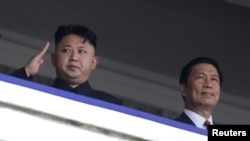Two former senior officials from the United States and South Korea say China’s policies towards North Korea remain unchanged despite the threat of another nuclear test by Pyongyang.
In a seminar held in Seoul Tuesday, Chun Yung-woo, the national security advisor to former South Korean President Lee Myung-bak, said that while China objects to a nuclear-armed North Korea, it still wants to pursue gradual changes in its approach to Pyongyang.
Experts have long argued that China is concerned about the possible influx of refugees through its border with the North should the impoverished regime collapse.
The former U.S. ambassador to China, Stapleton Roy, also said China has not changed its North Korea policy because a collapse of the reclusive regime would not help its national interest.
Still, Chun and Roy agreed Beijing’s policy toward its communist ally could change depending on the actions of Pyongyang.
Chun predicted that such a change of course will happen if North Korea continues actions that negatively impact China’s national interest. Roy said there are already some small changes in China’s underlying perceptions of North Korea.
Despite being a long-time ally of North Korea, China has put pressure on the country to resume six-party talks aimed at denuclearizing the Korean peninsula.
In a speech in Seoul Tuesday, Chinese Foreign Minister Wang Yi called for efforts to restart talks to resolve the North Korean nuclear issue. “[Neighbors] should make efforts to speedily put the North Korean nuclear issue on the path to dialogue that is irreversible, sustainable and effective,” said Wang.
This report was produced in collaboration with the VOA’s Korean Service.
In a seminar held in Seoul Tuesday, Chun Yung-woo, the national security advisor to former South Korean President Lee Myung-bak, said that while China objects to a nuclear-armed North Korea, it still wants to pursue gradual changes in its approach to Pyongyang.
Experts have long argued that China is concerned about the possible influx of refugees through its border with the North should the impoverished regime collapse.
The former U.S. ambassador to China, Stapleton Roy, also said China has not changed its North Korea policy because a collapse of the reclusive regime would not help its national interest.
Still, Chun and Roy agreed Beijing’s policy toward its communist ally could change depending on the actions of Pyongyang.
Chun predicted that such a change of course will happen if North Korea continues actions that negatively impact China’s national interest. Roy said there are already some small changes in China’s underlying perceptions of North Korea.
Despite being a long-time ally of North Korea, China has put pressure on the country to resume six-party talks aimed at denuclearizing the Korean peninsula.
In a speech in Seoul Tuesday, Chinese Foreign Minister Wang Yi called for efforts to restart talks to resolve the North Korean nuclear issue. “[Neighbors] should make efforts to speedily put the North Korean nuclear issue on the path to dialogue that is irreversible, sustainable and effective,” said Wang.
This report was produced in collaboration with the VOA’s Korean Service.





